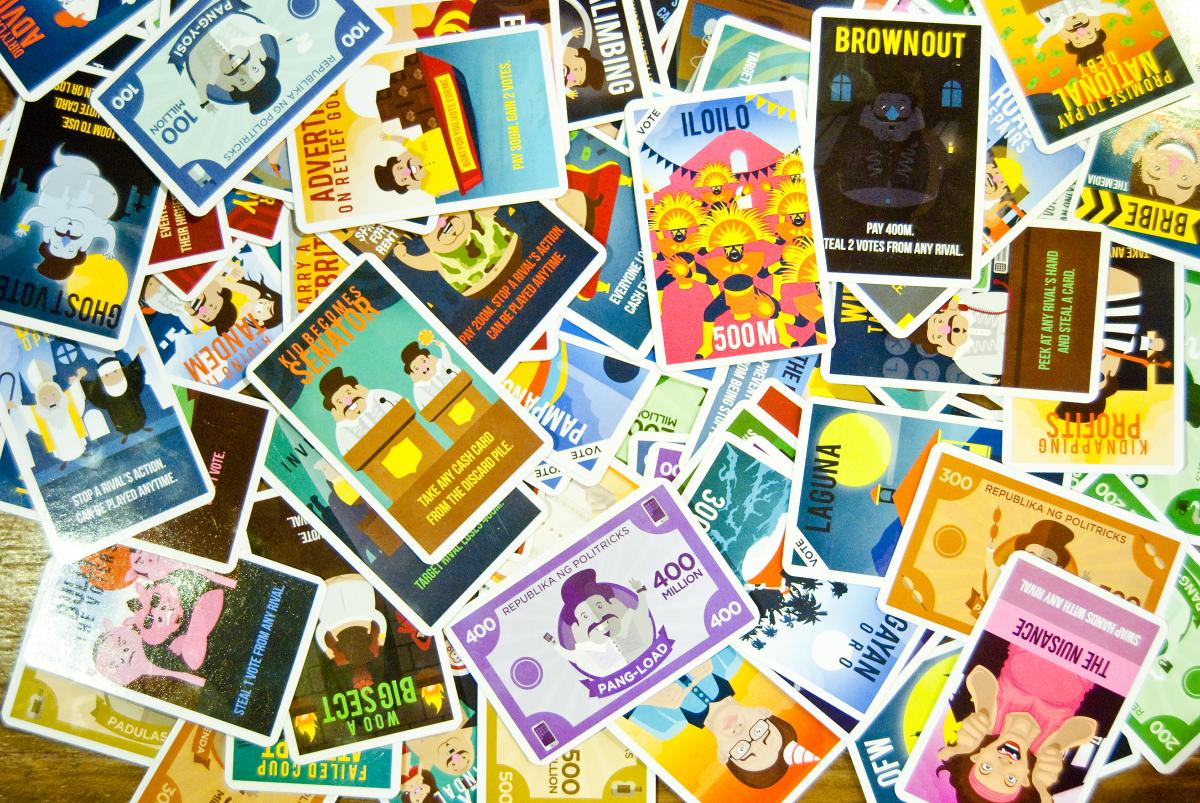May the Worst Politician Win
Entertaining as well as educational, this gently satirical card game inspired by the dirty politics of the Philippines hopes to open Filipinos’ eyes to the tricks their politicians play.
When he first moved to the Philippines for work two years ago, P. J. Lim encountered political campaigning in the unlikeliest of places—at funerals.
‘Some people are so poor that they can’t afford funerals, so politicians fund them, and you see their faces all over the condolence messages,’ says Lim, who hails from neighbouring Singapore. ‘It is ridiculous and it is real.’
That encounter sparked a conversation with his Filipino friend, R. B. Ting, about the crazy things that happen in that country’s politics. As the duo drew up a list that ran the gamut from marrying a celebrity to sex scandals, and even kidnapping opponents, they decided to create a game out of these examples in time for the Southeast Asian nation’s presidential elections in May 2016.

Politricks’ cards are inspired by the various ‘tricks’ Filipino politicians have used to win elections. The ‘Free Lechon Day’ card references the practice of distributing roast suckling pig (a popular but expensive dish in the Philippines) to sway voters. The ‘Bribe the Media’ card is inspired by cases of politicians offering money to journalists to cover their events or smear their opponents. The ‘Marry a Celebrity’ card points to the fact that many politicians are married to celebrity wives—what many feel is a strategic ploy to boost popularity.


Politricks is a card game where players do whatever it takes to win the most votes in an election. Living up to its tagline of ‘Guns · Goons · Gold’, the deck of 104 cards offers players the tricks, trapos (Filipino slang for archetypal politicians) and money they need in order to ambush, rig and bribe their way into power. From winning votes by offering the public free lechon (a popular pork dish in the Philippines), disrupting rivals by hiring protestors, or gaining an unfair advantage as ‘The Military Man’, every aspect of this satirical game is based on real-life events in the Philippines and the country’s political culture.
You seem to enjoy a good story
Sign up to our infrequent mailing to get more stories directly to your mailbox.The ‘Pork Barrel Scam’ card, for instance, refers to a 2013 scandal where several members of the Philippines congress allegedly siphoned off funds designated for development projects. Another ‘Accuse of Foreign Blood’ card was inspired by the recent controversy surrounding presidential candidate Grace Poe. Rivals questioned her eligibility as Poe had renounced her citizenship when she emigrated to the USA, although the Filipino-born had reacquired it when she returned years before running for office. Besides cards based on historical events, there are also money cards denominated in the various bribes popular amongst Filipino politicians, including pang-yosi (cigarette allowance) and pang-load (mobile phone allowance).
‘Everything you see in the deck looks ridiculous, but it all happened,’ explains Lim. ‘Some of it happens all the time.’

The duo felt a game similar to Monopoly and Cards Against Humanity, which they often play when not working their corporate jobs, was the best way to spark a conversation about this state of affairs. Such a fun format also ensured they would not sound preachy. As Ting explained at the game’s official launch, ‘People don’t want to be lectured, especially our generation, the millennials. We are showing what it is, and people make their own judgements when they play the game.’
Besides entertaining gameplay, the cards also offer amusing designs by Filipino illustrators Christian ‘Ice’ Gecolea and Armelle Garcia. They centre on the character Sir Pol, who is depicted carrying out the various tricks in comical situations such as posing as a lechon and being caught with his pants down in an affair. With his bloated form, pompadour hairstyle, and wearing the barong, a traditional formal garment of the Philippines, Gecolea says Pol is the epitome of the ‘generic politician physique’ in his country. The character also bears an uncanny resemblance to Joseph Estrada, a former president of the Philippines, and now mayor of Manila. Similarly, the trapos cards look like caricatures of well-known Filipino politicians, including the previous vice-president Jejomar Binay as ‘The President’s Lapdog’ and Imelda Marcos, the widow of the late Filipino dictator Ferdinand Marcos, as ‘The Mayor’s Wife’.
‘It’s kind of unfortunate, yet at the same time funny, that a number of politicians here in the Philippines are easy to depict since most of them gained their votes by doing the most outrageous things,’ explains Gecolea.
‘Whatever difficulty is thrown at them, the Filipinos remain optimistic and upbeat about life. But the country is not giving them the right opportunities.’
The creators would not confirm that these figures inspired the images (the game even comes with a disclaimer that ‘All characters & events appearing in this work are fictitious’) and according to Lim, the game was never about singling out individuals. In researching for this game, Lim and Ting spoke with representatives of both politics and the media to ensure their game was based on a list of tricks from all sides. Advice from journalists—and, as Lim notes, many Philippine journalists have been killed over the years—led them to use humour to take the sting out of their observations. ‘We actually toned down a lot of the things in our game,’ he says. ‘As outrageous as it is, the direction is more about poking fun and not pointing fingers to say someone is corrupt.’
Since Politricks’ launch in March 2016, thousands of copies have been sold for 600 Philippine pesos (US$12.10/€11.20) a deck. During the run-up to the presidential elections, retail stores such as the Fire Sword Board Game Café in Metro Manila could hardly keep stock long enough to display it. J. C. Pulido, a partner in the café, calls the game a ‘fairly accurate’ portrayal of the state of politics. ‘While Filipinos won’t admit it out loud, almost all, if not all, of the dirty activities depicted in the game do happen behind the scenes during our national elections,’ he says.

Corruption plagues Philippine politics to this day. On 18 February, 2017 the front page of the Philippine Daily Inquirer featured stories about the current president, accused of using his office to gain illegal wealth, about a senator accused of peddling illegal drugs, and about officials sacked over the ‘pork barrel funds’ scandal.
Although this entirely Made in Philippines game is about a less-than-savoury aspect of the country, Lim says they also tried to highlight the beauty which surprised him when he was based there for a year and a half. Politricks’ 19 vote cards depict the different regions of the Philippines, and illustrate their unique and colourful attractions from the mountainous ranges of the Cordilleras to the colourful Dinagyang Festival in Iloilo. ‘Whatever difficulty is thrown at them, the Filipinos remain optimistic and upbeat about life. But the country is not giving them the right opportunities,’ says Lim.
He adds that dirty politics is not unique to the Philippines and the game could very well describe elections elsewhere too. Pointing to how Donald Trump got elected in the 2016 United States elections, he says, ‘It’s all about playing tricks. It’s all about stirring up the emotions of the silent majority.’ But rather than seeing Politricks as a cynical response to politics, Lim says this game lays all the cards on the table to offer a ‘realistic’ view of any election. ‘If your end is to create a better life for the people and in doing so you need to have blood on your hands, it boils down to a personal choice,’ he says. ‘There is no right or wrong.’

